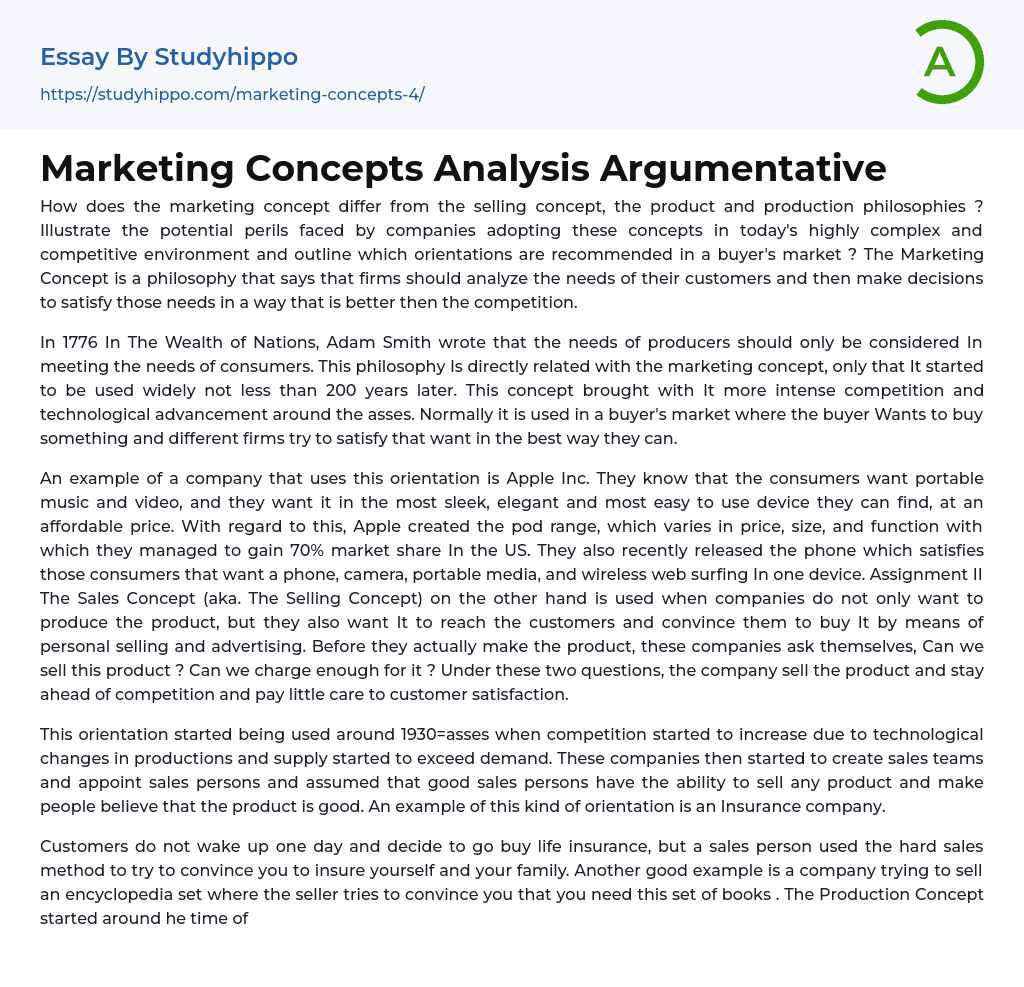The marketing concept, described in The Wealth of Nations by Adam Smith in 1776, involves surpassing competition and meeting customer needs. This approach became widely used later on, leading to increased competition and technological advancements. It is typically used in buyer's markets where firms compete to fulfill buyers' desires effectively. Apple Inc is an example of a company that embraces this approach by recognizing consumer demand for sleek, elegant, user-friendly, and affordable portable music and video devices. To meet this demand, Apple introduced a diverse range of iPods which ultimately captured 70% market share in the US. They have recently released a phone that satisfies consumers who desire a device combining a phone, camera, portable media player, and wireless web surfing capabilities.
Assignment II The Sales Concept (aka.The Selling Concept) is employed by compan
...ies seeking not only to produce a product but also to reach customers and persuade them through personal selling and advertising. Before creating the product, these companies evaluate if they can sell it at an appropriate price point.
The text highlights how companies in the past prioritized selling products over customer satisfaction. In response to increased competition, companies formed sales teams and hired skilled salespersons who could sell any product effectively. This approach, known as the Production Concept, emerged during the industrial revolution and continued for years. During this time, businesses focused on efficiently producing large quantities of a specific product at a low cost to maximize profits through economies of scale. Meeting customer needs was not a priority; instead, increasing output was emphasized. An example of this concept can be seen in Ford's early years when they concentrated on mass productio
without considering variations like color due to high demand for their vehicles.The Product Orientation, similar to the Production Concept, believes that customers prefer products with innovative features or enhanced performance and competitive pricing. However, it became impractical to produce in large quantities over time. Entrepreneurs began questioning if their more expensive products were better than the competition. Unfortunately, there was still little interest in customer needs or researching competitors. GM Motors famously said, "how can a customer know what he wants until he sees what is available?" Some businesses excessively focused on their own products and became arrogant, thinking they were superior. Yet, when these companies failed to keep up with technology or trends, their products quickly became obsolete and lost market share. The marketing concept differs significantly from the other three concepts as it takes an outside-in approach. It starts by analyzing the target market and understanding customer needs and desires before developing a product that satisfies those needs in a superior way compared to competitors.A marketing-oriented company focuses solely on providing desired goods or services and embracing market changes. In contrast, a sales-oriented company aims to sell excess inventory and uses selling and promotion to understand customers. A customer-centric company believes in satisfying dissatisfied customers and changing policies accordingly. However, adopting a marketing orientation presents challenges such as addressing unrelated customer desires, resulting in various unrelated products. Managing these products becomes difficult without separate departments under different brand managers who tend to blame each other when issues arise. On the other hand, a sales orientation primarily focuses on short-term goals with little interest in after-sales service. As a result, if a customer feels
dissatisfied (e.g., after purchasing an encyclopedia set), the company has limited ability to resolve the problem, creating weak customer relationships.Companies that adhere to product or production philosophies often make the mistake of focusing solely on the physical product. This can sometimes lead to confusion among customers when unnecessary features are added that do not address their actual needs. In a Buyer's Market, where buyers have more power due to an excess supply of goods and falling prices, it is crucial for success to have a superior product at a competitive price. To succeed in the mobile phone industry, understanding the competition and offering a product that surpasses what is currently available is key. There are numerous companies in this industry, each providing various phones to cater to different customer preferences. To enter and compete in this market, conducting thorough customer research and developing an affordably priced device with innovative features is important. Apple's success with their phone serves as an example of this approach, while Nokia offers a wide range of models to meet diverse customer needs.
Bibliography:
- http://en.Wikipedia.org/wiki/Marketing
- http://www.Antenna.Com/marketing/concept/
- http://www.Tutor.Net/business/marketing/marketing_orientation_alternatives.Asp
- Marketing Advanced Lecture Topic 1 - Mr..Theresa Hobbs
- Advertising essays
- Audience Theory essays
- Competitor Analysis essays
- Consumer essays
- Marketing Management essays
- Marketing Mix essays
- Marketing Plan essays
- Marketing Research essays
- Marketing Strategy essays
- Point Of Sale essays
- Price essays
- Procurement essays
- Product essays
- Product Differentiation essays
- Promotion essays
- Promotion And Marketing Communications essays
- Retailing essays
- Trademark essays
- Anheuser-busch essays
- Brands essays
- Detergent essays
- Product Placement essays
- Research Design essays
- New Product Development essays
- Advertisement essays
- Brand essays
- Sales Promotion essays
- Advertising campaign essays
- Consumer behaviour essays
- Offer And Acceptance essays
- Wal-Mart essays
- Discover essays
- Customer essays
- Customer Satisfaction essays
- Customer Service essays
- Target Market essays
- Accounting essays
- Andrew Carnegie essays
- Automation essays
- Business Cycle essays
- Business Intelligence essays
- Business Model essays
- Business Operations essays
- Business Software essays
- Cooperation essays
- Cooperative essays
- Corporate Social Responsibility essays
- Corporation essays
- Customer Relationship Management essays
- Family Business essays




